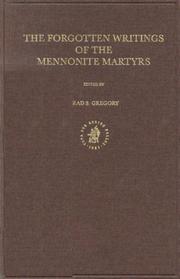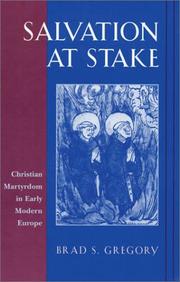| Listing 1 - 10 of 14 | << page >> |
Sort by
|

ISBN: 9004120874 9004381988 Year: 2002 Publisher: Leiden Brill
Abstract | Keywords | Export | Availability | Bookmark
 Loading...
Loading...Choose an application
- Reference Manager
- EndNote
- RefWorks (Direct export to RefWorks)
This volume is a collection of prison writings by seven Dutch Mennonite martyrs executed between 1569 and 1592, first published in the late sixteenth and early seventeenth centuries, but until now almost entirely neglected even by specialists in the Radical Reformation. Included are some forty-nine letters, fifteen songs, a poem, a treatise, and six Tafereelen ('tableaux'), plus four letters written to the martyrs, several editorial prefaces and introductions, and several archival documents pertaining to the execution of the martyrs. An introduction contextualizes the writings and explains the reasons for their exclusion from the Mennonite martyrological tradition. This collection adds to the primary sources pertaining to Anabaptist martyrs, Dutch Mennonites, and the Radical Reformation, supplementing van Braght's Martyrs' Mirror. Published as Kerkhistorische Bijdragen , Documenta Anabaptistica , volume 8
Christian church history --- Germany --- 289.7 --- Mennonieten --- 289.7 Mennonieten --- Mennonite authors. --- Mennonites --- Christian martyrs in literature. --- Anabaptists --- Catabaptists --- Habans --- Reformation --- Baptists --- Peasants' War, 1524-1525 --- Christian sects --- Authors, Mennonite --- Sources.
Book
ISBN: 9780062471185 Year: 2018 Publisher: New York HarperOne
Abstract | Keywords | Export | Availability | Bookmark
 Loading...
Loading...Choose an application
- Reference Manager
- EndNote
- RefWorks (Direct export to RefWorks)
Book
ISBN: 0674062582 9780674062580 9780674045637 0674045637 9780674088054 0674088050 Year: 2012 Publisher: Cambridge, Mass. Belknap Press of Harvard University Press
Abstract | Keywords | Export | Availability | Bookmark
 Loading...
Loading...Choose an application
- Reference Manager
- EndNote
- RefWorks (Direct export to RefWorks)
In a work that is as much about the present as the past, Brad Gregory identifies the unintended consequences of the Protestant Reformation and traces the way it shaped the modern condition over the course of the following five centuries. A hyperpluralism of religious and secular beliefs, an absence of any substantive common good, the triumph of capitalism and its driver, consumerism-all these, Gregory argues, were long-term effects of a movement that marked the end of more than a millennium during which Christianity provided a framework for shared intellectual, social, and moral life in the West.Before the Protestant Reformation, Western Christianity was an institutionalized worldview laden with expectations of security for earthly societies and hopes of eternal salvation for individuals. The Reformation's protagonists sought to advance the realization of this vision, not disrupt it. But a complex web of rejections, retentions, and transformations of medieval Christianity gradually replaced the religious fabric that bound societies together in the West. Today, what we are left with are fragments: intellectual disagreements that splinter into ever finer fractals of specialized discourse; a notion that modern science-as the source of all truth-necessarily undermines religious belief; a pervasive resort to a therapeutic vision of religion; a set of smuggled moral values with which we try to fertilize a sterile liberalism; and the institutionalized assumption that only secular universities can pursue knowledge.The Unintended Reformation asks what propelled the West into this trajectory of pluralism and polarization, and finds answers deep in our medieval Christian past.
Secularism --- Reformation. --- History.

ISBN: 0674264061 0674037936 0674007042 0674785517 Year: 1999 Publisher: Harvard University Press
Abstract | Keywords | Export | Availability | Bookmark
 Loading...
Loading...Choose an application
- Reference Manager
- EndNote
- RefWorks (Direct export to RefWorks)
Thousands of men and women were executed for incompatible religious views in sixteenth-century Europe. The meaning and significance of those deaths are studied here comparatively for the first time, providing a compelling argument for the importance of martyrdom as both a window onto religious sensibilities and a crucial component in the formation of divergent Christian traditions and identities. Gregory explores Protestant, Catholic, and Anabaptist martyrs in a sustained fashion, addressing the similarities and differences in their self-understanding. He traces the processes and impact of their memorialization by co-believers, and he reconstructs the arguments of the ecclesiastical and civil authorities responsible for their deaths. In addition, he assesses the controversy over the meaning of executions for competing views of Christian truth, and the intractable dispute over the distinction between true and false martyrs. He employs a wide range of sources, including pamphlets, martyrologies, theological and devotional treatises, sermons, songs, woodcuts and engravings, correspondence, and legal records. Reconstructing religious motivation, conviction, and behavior in early modern Europe, Gregory shows us the shifting perspectives of authorities willing to kill, martyrs willing to die, martyrologists eager to memorialize, and controversialists keen to dispute.
Book
ISBN: 9780674037939 Year: 2022 Publisher: Cambridge, MA
Abstract | Keywords | Export | Availability | Bookmark
 Loading...
Loading...Choose an application
- Reference Manager
- EndNote
- RefWorks (Direct export to RefWorks)
Book
ISBN: 9780674062580 Year: 2012 Publisher: Cambridge, MA
Abstract | Keywords | Export | Availability | Bookmark
 Loading...
Loading...Choose an application
- Reference Manager
- EndNote
- RefWorks (Direct export to RefWorks)
Digital
ISBN: 9780674037939 Year: 2022 Publisher: Cambridge, Mass. Harvard University Press
Abstract | Keywords | Export | Availability | Bookmark
 Loading...
Loading...Choose an application
- Reference Manager
- EndNote
- RefWorks (Direct export to RefWorks)
Digital
ISBN: 9780674062580 9780674045637 Year: 2012 Publisher: Cambridge, Mass. Harvard University Press
Abstract | Keywords | Export | Availability | Bookmark
 Loading...
Loading...Choose an application
- Reference Manager
- EndNote
- RefWorks (Direct export to RefWorks)
Book
ISBN: 9780268022983 0268022984 Year: 2009 Publisher: Notre Dame, Ind. University of Notre Dame Press
Abstract | Keywords | Export | Availability | Bookmark
 Loading...
Loading...Choose an application
- Reference Manager
- EndNote
- RefWorks (Direct export to RefWorks)
History as a science --- Religion --- Intellectual life --- Vie intellectuelle --- History. --- Histoire --- 930.21 --- 27 <063> --- -Intellectual life --- -Cultural life --- Culture --- Religion, Primitive --- Atheism --- God --- Irreligion --- Religions --- Theology --- Historiografie. Geschiedenis van de geschiedwetenschap --- Kerkgeschiedenis--Congressen --- -Historiografie. Geschiedenis van de geschiedwetenschap --- 930.21 Historiografie. Geschiedenis van de geschiedwetenschap --- -930.21 Historiografie. Geschiedenis van de geschiedwetenschap --- Cultural life --- Religious history --- Intellectual history --- History
Book
ISBN: 9004451501 Year: 1991 Publisher: Leiden : Brill,
Abstract | Keywords | Export | Availability | Bookmark
 Loading...
Loading...Choose an application
- Reference Manager
- EndNote
- RefWorks (Direct export to RefWorks)
This new and complete translation of Spinoza's famous 17th-century work fills an important gap, not only for all scholars of Spinoza, but also for everyone interested in the relationship between Western philosophy and religion, and the history of biblical exegesis. The existing Elwes translation of 1883 has long been regarded as insufficient by Spinoza scholars for its misleading rendering of the Latin and its many omissions. Samuel Shirley, well-known for his excellent best-selling translation of Spinoza's "Ethics," now presents this new, complete translation of Spinoza's "Tractatus Theologico-Politicus" in lucid English, which meets the highest standards of modern critical scholarship. The book includes an Index of Subjects and a detailed Index of Biblical References as well as an Introduction by Brad Gregory, which sets Spinoza squarely in the context of his time and intellectual tradition.
| Listing 1 - 10 of 14 | << page >> |
Sort by
|

 Search
Search Feedback
Feedback About UniCat
About UniCat  Help
Help News
News